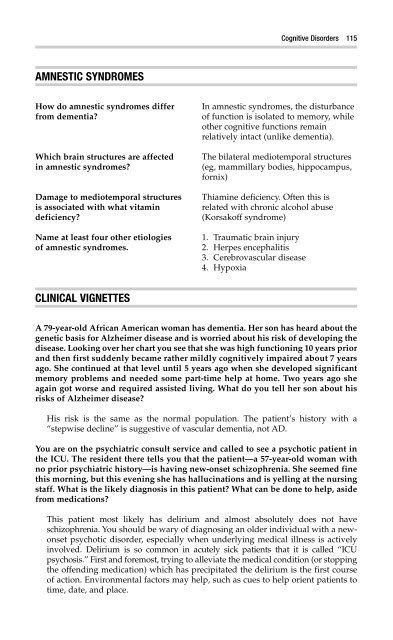Behavioral Science
Create successful ePaper yourself
Turn your PDF publications into a flip-book with our unique Google optimized e-Paper software.
Cognitive Disorders 113<br />
How does dementia differ from the<br />
normal memory changes of aging?<br />
When diagnosing dementia, what other<br />
disorders in your differential are key<br />
to rule out?<br />
What is the prevalence of dementia?<br />
What is the most common type<br />
of dementia?<br />
What is the classical clinical course<br />
for Alzheimer disease?<br />
How does this differ from the course<br />
of vascular dementia?<br />
As we age, we are less able to learn new<br />
information, and we process information<br />
at a slower speed.<br />
However, these changes do not normally<br />
interfere with the basic functioning.<br />
It is crucial that you do not miss a<br />
delirium or a depression. In the elderly,<br />
it is not uncommon for them to report<br />
multiple memory complaints. If you<br />
misdiagnose this as dementia, you will<br />
miss a potentially reversible cause of<br />
memory impairment. Likewise, if you<br />
miss a delirium, you may miss a<br />
potentially serious medical problem.<br />
Additionally, there are several potentially<br />
reversible causes of dementia that you<br />
should look for, including: neurosyphilis,<br />
vitamin B 12 , thiamine, and folate<br />
deficiencies, and normal pressure<br />
hydrocephalus.<br />
Incidence/prevalence increases with<br />
age. The prevalence is approximately<br />
1.5 % in those over 65 years of age. The<br />
prevalence increases to 20% after age 85.<br />
Alzheimer Disease (AD) represents<br />
about 50% to 60% of dementias. The<br />
second most common form is vascular<br />
dementia (formerly multi-infarct<br />
dementia)<br />
Others include front temporal (Pick<br />
and Creutzfeldt-Jakob), Parkinson,<br />
Huntington, and human<br />
immunodeficiency virus (HIV)<br />
dementias.<br />
Slow, gradual onset of memory loss<br />
and cognitive impairment (often there<br />
are problems with judgment, mood<br />
symptoms, and behavioral disturbances<br />
as well). The disease is progressive and<br />
death usually occurs within 3 years<br />
after diagnosis.<br />
Vascular dementia classically has a<br />
stepwise decline, as opposed to the slow<br />
and steady decline in Alzheimer. Onset<br />
of deficits may be abrupt, and with good<br />
control of cardiovascular risk factors the<br />
course may remain relatively stable.



